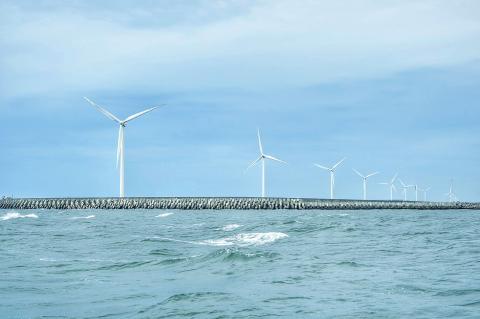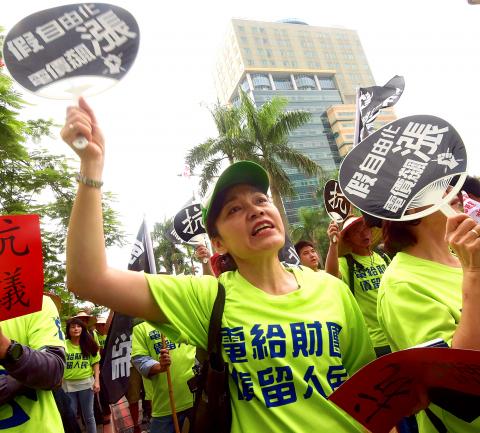Academics yesterday criticized the Executive Yuan’s policy stance on a draft amendment to the Electricity Act (電業法) as a “great” setback for the government’s policy to liberalize the nation’s electricity industry.
“The government’s stance represents a policy U-turn, because Taipower [Taiwan Power Co (台電)] would still monopolize the industry,” said Kimmie Wang (王京明), research fellow at the Chung-Hua Institution for Economic Research’s (中華經濟研究院) Center for Energy and Environmental Research.
The proposed amendment would make no difference to liberalizing the industry, because non-renewable energy firms are still not allowed to enter the market to compete with Taipower, he said.

Photo: Courtesy of Taiwan Power Co
Wang’s criticism came after the Executive Yuan on Thursday outlined the draft amendment.
Cabinet spokesman Hsu Kuo-yung (徐國勇) said the draft would focus on developing the “green” energy industry in its first phase as part of government efforts to reduce thermal electricity generation and carbon emissions, and to improve environmental protection.
Hsu said “renewable” energy companies and power distribution firms would be allowed to sell electricity directly to enterprises through Taipower’s distribution network or by setting up their own distribution networks.

Photo: Huang Yao-cheng, Taipei Times
In the second phase, Taipower would be split into two companies — a power generation company and an electrical grid company — six years after the amendment takes effect, as part of efforts to liberalize the industry, Hsu said.
Private power generators still cannot sell their electricity to households, he said.
National Taiwan University Atmospheric Science professor Gloria Hsu (徐光蓉) said she is very disappointed that Taipower is likely to retain its monopoly in the industry.
As the Electricity Act has not been amended for nearly two decades, the government may fall short of liberalizing the industry, she said.
“The proposed amendment has ended the possibility of developing a healthy electricity industry in the nation,” she said by telephone.
Taiwan has used a feed-in tariff (FIT) program for several years in a bid to accelerate investment in “renewable” technologies by offering favorable prices to “green” energy producers.
However, if the government does not plan to initiate a sunset clause to the FIT program, Wang said many “renewable” energy producers would continue with the scheme to avoid additional costs, such as erecting power lines.
Bureau of Energy Director-General Lin Chuan-neng (林全能) said he does not think the policy is a setback for the government.
He said that the amendment is not exactly the same version the bureau drafted a few months ago, but it would still change the industry and provide stable electricity supplies.
Lin said giving the “renewable” energy industry more flexibility is a big step for the government and separating Taipower into two companies in six years would also pave the way toward liberalizing the industry.
“If the government pushes the liberalization too hard it will make it more difficult to reform the industry,” Lin said.
The bureau is to send a final version of the draft amendment to the Executive Yuan next week for approval, before submitting it to the Legislative Yuan for further review, it said.

SECURITY: As China is ‘reshaping’ Hong Kong’s population, Taiwan must raise the eligibility threshold for applications from Hong Kongers, Chiu Chui-cheng said When Hong Kong and Macau citizens apply for residency in Taiwan, it would be under a new category that includes a “national security observation period,” Mainland Affairs Council (MAC) Minister Chiu Chui-cheng (邱垂正) said yesterday. President William Lai (賴清德) on March 13 announced 17 strategies to counter China’s aggression toward Taiwan, including incorporating national security considerations into the review process for residency applications from Hong Kong and Macau citizens. The situation in Hong Kong is constantly changing, Chiu said to media yesterday on the sidelines of the Taipei Technology Run hosted by the Taipei Neihu Technology Park Development Association. With

A US Marine Corps regiment equipped with Naval Strike Missiles (NSM) is set to participate in the upcoming Balikatan 25 exercise in the Luzon Strait, marking the system’s first-ever deployment in the Philippines. US and Philippine officials have separately confirmed that the Navy Marine Expeditionary Ship Interdiction System (NMESIS) — the mobile launch platform for the Naval Strike Missile — would take part in the joint exercise. The missiles are being deployed to “a strategic first island chain chokepoint” in the waters between Taiwan proper and the Philippines, US-based Naval News reported. “The Luzon Strait and Bashi Channel represent a critical access

‘FORM OF PROTEST’: The German Institute Taipei said it was ‘shocked’ to see Nazi symbolism used in connection with political aims as it condemned the incident Sung Chien-liang (宋建樑), who led efforts to recall Democratic Progressive Party (DPP) Legislator Lee Kun-cheng (李坤城), was released on bail of NT$80,000 yesterday amid an outcry over a Nazi armband he wore to questioning the night before. Sung arrived at the New Taipei City District Prosecutors’ Office for questioning in a recall petition forgery case on Tuesday night wearing a red armband bearing a swastika, carrying a copy of Adolf Hitler’s Mein Kampf and giving a Nazi salute. Sung left the building at 1:15am without the armband and apparently covering the book with a coat. This is a serious international scandal and Chinese

COUNTERINTELLIGENCE TRAINING: The ministry said 87.5 percent of the apprehended Chinese agents were reported by service members they tried to lure into becoming spies Taiwanese organized crime, illegal money lenders, temples and civic groups are complicit in Beijing’s infiltration of the armed forces, the Ministry of National Defense (MND) said in a report yesterday. Retired service members who had been turned to Beijing’s cause mainly relied on those channels to infiltrate the Taiwanese military, according to the report to be submitted to lawmakers ahead of tomorrow’s hearing on Chinese espionage in the military. Chinese intelligence typically used blackmail, Internet-based communications, bribery or debts to loan sharks to leverage active service personnel to do its bidding, it said. China’s main goals are to collect intelligence, and develop a